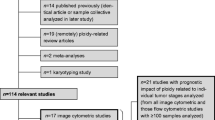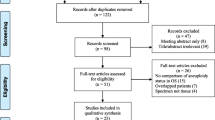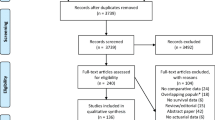Abstract
Purpose
In colorectal cancer, the negative effect of aneuploidy has been a controversy for more than 20 years. Studies to determine a survival-deoxyribonucleic acid content relationship have conflicting results. A systematic literature search followed by a meta-analysis of published studies addressing prognostic effect of aneuploidy for patients who underwent surgical treatment of colon and rectal cancer was conducted.
Methods
The main outcome measure was the five-year overall mortality rate after surgical resection. For the selected studies, we estimated this outcome for three subsets of patients through separate meta-analyses: 1) for all patients with colorectal cancer; 2) only between patients with Stage II colon cancer; and 3) only for studies in which follow-up losses were declared. The presence of publication bias was assessed with a funnel plot for asymmetry.
Results
A total of 5,478 patients with colorectal cancer were represented in 32 studies (Group 1), we estimated a reduction in the five-year overall mortality from 43.2 percent for aneuploid tumors to 29.2 percent for diploid tumors (combined relative risk--.44; 95 percent confidence interval--.34-.55; P-lt;-.001). In addition, 357 patients with Stage II colon cancer (Group 2) extracted from three studies had an absolute reduction of 14.3 percent in five-year overall mortality favoring diploid tumors (combined relative risk--.93; 95 percent confidence interval--.29-.89; P--.001). Lastly, of 14 studies in which follow-up losses were declared (Group 3), 2,221 patients were represented and a 15.7 percent mortality reduction was measured favoring patients with diploid tumors (combined relative risk--.44; 95 percent confidence interval--.3-.61; P-lt;-.001).
Conclusions
Patients who undergo an aneuploid colorectal cancer surgical resection have a higher risk of death after five years. This finding may ultimately impact survival of patients with node-negative colon cancer through adjuvant therapy.





Similar content being viewed by others
References
Pisani P, Parkin DM, Bray F, Ferlay J. Estimates of the worldwide mortality from 25 cancers in 1990. Int J Cancer 1999;83:18–29.
Jemal A, Tiwari RC, Murray T, et al. Cancer statistics, 2004. CA Cancer J Clin 2004;54:8–29
Friedlander ML, Hedley DW, Taylor IW. Clinical and biological significance of aneuploidy in human tumours. J Clin Pathol 1984;37:961-4.
Barlogie B, Raber MN, Schumann J, et al. Flow cytometry in clinical cancer research. Cancer Res 1983;43:3982-7.
Wolley RC, Schreiber K, Koss LG, Karas M, Sherman A. DNA distribution in human colon carcinomas and its relationship to clinical behavior. J Natl Cancer Inst 1982;69:15–22.
Quirke P, Fozard JB, Dixon MF, Dyson JE, Giles GR, Bird CC. DNA aneuploidy in colorectal adenomas. Br J Cancer 1986;53:477-1.
Goh HS, Jass JR. DNA content and the adenoma-carcinoma sequence in the colorectum. J Clin Pathol 1986;39:387-2.
Scott NA, Rainwater LM, Wieand HS, et al. The relative prognostic value of flow cytometric DNA analysis and conventional clinicopathologic criteria in patients with operable rectal carcinoma. Dis Colon Rectum 1987;30:513-0.
Fisher ER, Siderits RH, Sass R, Fisher B. Value of assessment of ploidy in rectal cancers. Arch Pathol Lab Med 1989;113:525-.
Jass JR, Mukawa K, Goh HS, Love SB, Capellaro D. Clinical importance of DNA content in rectal cancer measured by flow cytometry. J Clin Pathol 1989;42:254-.
Kokal WA, Gardine RL, Sheibani K, et al. Tumor DNA content in resectable, primary colorectal carcinoma. Ann Surg 1989;209:188-3.
Heimann TM, Miller F, Martinelli G, et al. Significance of DNA content abnormalities in small rectal cancers. Am J Surg 1990;159:199–202.
Halvorsen TB, Johannesen E. DNA ploidy, tumour site, and prognosis in colorectal cancer. A flow cytometric study of paraffin-embedded tissue. Scand J Gastroenterol 1990;25:141-.
Enker WE, Kimmel M, Cibas ES, Cranor ML, Melamed MR. DNA/RNA content and proliferative fractions of colorectal carcinomas: a five-year prospective study relating flow cytometry to survival. J Natl Cancer Inst 1991;83:701-.
Giaretti W, Danova M, Geido E, et al. Flow cytometric DNA index in the prognosis of colorectal cancer. Cancer 1991;67:1921-.
Harlow SP, Eriksen BL, Poggensee L, et al. Prognostic implications of proliferative activity and DNA aneuploidy in Astler-Coller Dukes stage C colonic adenocarcinomas. Cancer Res 1991;51:2403-.
Witzig TE, Loprinzi CL, Gonchoroff NJ, et al. DNA ploidy and cell kinetic measurements as predictors of recurrence and survival in stages B2 and C colorectal adenocarcinoma. Cancer 1991;68:879-8.
Michelassi F, Ewing C, Montag A, et al. Prognostic significance of ploidy determination in rectal cancer. Hepatogastroenterology 1992;39:222-.
Li J, Jiang Y, Wei W, Zhang S. Clinical significance of cellular DNA ploidy in rectal cancer less than 3 cm in diameter. Chin Med Sci J 1993;8:143-.
Yamazoe Y, Maetani S, Nishikawa T, Onodera H, Tobe T, Imamura M. The prognostic role of the DNA ploidy pattern in colorectal cancer analysis using paraffin-embedded tissue by an improved method. Surg Today 1994;24:30-.
Chapman MA, Hardcastle JD, Armitage NC. Five-year prospective study of DNA tumor ploidy and colorectal cancer survival. Cancer 1995;76:383-.
Nori D, Merimsky O, Samala E, et al. Tumor ploidy as a risk factor for disease recurrence and short survival in surgically-treated Dukes-B2 colon cancer patients. J Surg Oncol 1995;59:239-2.
Kay EW, Mulcahy HE, Curran B, O’Donoghue DP, Leader M. An image analysis study of DNA content in early colorectal cancer. Eur J Cancer 1996;32A:612-.
Takanishi DM Jr, Hart J, Covarelli P, Chappell R, Michelassi F. Ploidy as a prognostic feature in colonic adenocarcinoma. Arch Surg 1996;131:587-2.
Tonouchi H, Matsumoto K, Kinoshita T, Itoh H, Suzuki H. Prognostic value of DNA ploidy patterns of colorectal adenocarcinoma: univariate and multivariate analysis. Dig Surg 1998;15:687-2.
Yamamoto T, Matsumoto K, Iriyama K. Prognostic significance of the DNA index in a colorectal cancer. Surg Today 1998;28:792-.
Lanza G, Gafa R, Santini A, et al. Prognostic significance of DNA ploidy in patients with stage II and stage III colon carcinoma: a prospective flow cytometric study. Cancer 1998;82:49–59.
Flyger HL, Larsen JK, Nielsen HJ, Christensen IJ. DNA ploidy in colorectal cancer, heterogeneity within and between tumors and relation to survival. Cytometry 1999;38:293–300.
Risques RA, Moreno V, Marcuello E, et al. Redefining the significance of aneuploidy in the prognostic assessment of colorectal cancer. Lab Invest 2001;81:307-5.
Geido E, Sciutto A, Rubagotti A, et al. Combined DNA flow cytometry and sorting with k-ras2 mutation spectrum analysis and the prognosis of human sporadic colorectal cancer. Cytometry 2002;50:216-4.
Russo A, Migliavacca M, Zanna I, et al. p53 mutations in L3-loop zinc-binding domain, DNA-ploidy, and S phase fraction are independent prognostic indicators in colorectal cancer: a prospective study with a five-year follow-up. Cancer Epidemiol Biomarkers Prev 2002;11:1322-1.
Berczi C, Bocsi J, Bartha I. Prognostic value of DNA ploidy status in patients with rectal cancer. Anticancer Res 2002;22:3737-1.
Garrity MM, Burgart LJ, Mahoney MR, et al. Prognostic value of proliferation, apoptosis, defective DNA mismatch repair, and p53 overexpression in patients with resected Dukes-B2 or C colon cancer: a North Central Cancer Treatment Group Study. J Clin Oncol 2004; 22:1572-2.
American Joint Commission on Cancer. AJCC Cancer staging manual. 6th ed. Springer, 2003.
Figueredo A, Charette ML, Maroun J, Brouwers MC, Zuraw L. Adjuvant therapy for stage II colon cancer: a systematic review from the Cancer Care Ontario Program in evidence-based care’s gastrointestinal cancer disease site group. J Clin Oncol 2004;22:3395-07.
Egger M, Davey Smith G, Schneider M, Minder C. Bias in meta-analysis detected by a simple, graphical test. BMJ 1997;315:629-4.
Melamed MR, Enker WE, Banner P, Janov AJ, Kessler G, Darzynkiewicz Z. Flow cytometry of colorectal carcinoma with three-year follow-up. Dis Colon Rectum 1986;29:184-.
Enblad P, Glimelius B, Bengtsson A, Ponten J, Pahlman L. The prognostic significance of DNA content in carcinoma of the rectum and rectosigmoid. Acta Chir Scand 1987;153:453-.
Schutte B, Reynders MM, Wiggers T, et al. Retrospective analysis of the prognostic significance of DNA content and proliferative activity in large bowel carcinoma. Cancer Res 1987;47:5494-.
Rognum TO, Thorud E, Lund E. Survival of large bowel carcinoma patients with different DNA ploidy. Br J Cancer 1987;56:633-.
Givel JC, de Quay N, Albe X, Vassilakos P. Prognostic value of DNA ploidy of colorectal tumor cells [in French]. Helv Chir Acta 1989;55:679-3.
Heimann TM, Martinelli G, Szporn A, et al. Prognostic significance of DNA content abnormalities in young patients with colorectal cancer. Ann Surg 1989;210:792-.
Albe X, Vassilakos P, Helfer-Guarnori K, et al. Independent prognostic value of ploidy in colorectal cancer. A prospective study using image cytometry. Cancer 1990;66:1168-5.
Robey-Cafferty SS, el-Naggar AK, Grignon DJ, Cleary KR, Ro JY. Histologic parameters and DNA ploidy as predictors of survival in stage B adenocarcinoma of colon and rectum. Mod Pathol 1990;3:261-.
Schillaci A, Tirindelli DD, Ferri M, et al. Flow cytometric analysis in colorectal carcinoma: prognostic significance of cellular DNA content. Int J Colorectal Dis 1990;5:223-.
Baretton G, Gille J, Oevermann E, Lohrs U. Flow-cytometric analysis of the DNA-content in paraffin-embedded tissue from colorectal carcinomas and its prognostic significance. Virchows Arch B Cell Pathol Incl Mol Pathol 1991;60:123-1.
Bawani M, Tibrewala S, Copur S, Harris D, Gilman-Sachs A. DNA flow cytometry of colorectal carcinoma: correlation of DNA stemlines with other prognostic indices. Am J Gastroenterol 1991;86:191-.
Bosari S, Lee AK, Wiley BD, Heatley GJ, Hamilton WM, Silverman ML. DNA quantitation by image analysis of paraffin-embedded colorectal adenocarcinomas and its prognostic value. Mod Pathol 1992;5:324-.
Koha M, Wikstrom B, Brismar B. Colorectal carcinoma. DNA ploidy pattern and prognosis with reference to tumor DNA heterogeneity. Anal Quant Cytol Histol 1992;14:367-2.
Silvestrini R, D’Agnano I, Faranda A, et al. Flow cytometric analysis of ploidy in colorectal cancer: a multicentric experience. Br J Cancer 1993;67:1042-.
Bianchi A, Mallofre C, Serrano A, Sunol J, Barja J, Ubach M. DNA as a prognostic factor in colorectal cancer. A retrospective analysis of 34 patients [in Spanish]. Rev Esp Enferm Dig 1993;84:100-.
Foggi E, Carbognani P. The value of ploidy in the prognosis of the colorectal cancer. Acta Biomed Ateneo Parmense 1993;64:185-4.
Mazzei T, Tonelli F, Mini E, et al. Flow cytometric analysis of DNA ploidy and cell proliferation activity in colorectal carcinoma. Anticancer Res 1995;15:2247-3.
Zarbo RJ, Nakhleh RE, Brown RD, Kubus JJ, Ma CK, Mackowiak P. Prognostic significance of DNA ploidy and proliferation in 309 colorectal carcinomas as determined by two-color multiparametric DNA flow cytometry. Cancer 1997;79:2073-6.
Cosimelli M, D’Agnano I, Tedesco M, et al. The role of multiploidy as unfavorable prognostic variable in colorectal cancer. Anticancer Res 1998;18:1957-5.
Sampedro A, Salas-Bustamante A, Lopez-Artimez M, Garcia-Muniz JL, Urdiales G. Cell cycle flow cytometric analysis in the diagnosis and management of colorectal carcinoma. Anal Quant Cytol Histol 1999;21:347-2.
Michel P, Paresy M, Lepessot F, et al. Pre-operative kinetic parameter determination of colorectal adenocarcinomas. Prognostic significance. Eur J Gastroenterol Hepatol 2000;12:275-0.
Araujo SE, Habr-Gama A, Sousa AH Jr, Venco FE, El-Ibrahim R. Valor prognóstico do conteúdo celular de DNA e da atividade proliferativa tumoral no câncer colorretal. Comparação com as variáveis clínico-patológicas convencionais. Rev bras Coloprocto 2000;20:178-0.
Buglioni S, D’Agnano I, Vasselli S, et al. p53 nuclear accumulation and multiploidy are adverse prognostic factors in surgically resected stage II colorectal cancers independent of fluorouracil-based adjuvant therapy. Am J Clin Pathol 2001;116:360-.
Karelia NH, Patel DD, Desai NS, et al. Prognostic significance of DNA aneuploidy and p21 ras oncoprotein expression in colorectal cancer and their role in the determination of treatment modalities. Int J Biol Markers 2001;16:97–104.
Lin JK, Chang SC, Yang SH, Jiang JK, Chen WC, Lin TC. Prognostic value of DNA ploidy patterns of colorectal adenocarcinoma. Hepatogastroenterology 2003;50:1927-2.
Grigolato P, Chioda C, Salerni B, et al. DNA index of colorectal carcinoma and follow-up [in Italian]. Pathologica 1992;84:311-.
Sun XF, Carstensen JM, Stal O, et al. Prognostic significance of p53 expression in relation to DNA ploidy in colorectal adenocarcinoma. Virchows Arch A Pathol Anat Histopathol 1993;423:443-.
Deans GT, Williamson K, Hamilton P, et al. DNA densitometry of colorectal cancer. Gut 1993;34:1566-1.
Deans GT, Williamson K, Heatley M, et al. The role of flow cytometry in carcinoma of the colon and rectum. Surg Gynecol Obstet 1993;177:377-2.
Sciallero S, Bonelli L, Geido E, et al. Lack of prognostic value of flow cytometric DNA content analysis in colorectal adenocarcinomas. Eur J Cancer 1994;30A:569.
Tang R, Ho YS, You YT, et al. Prognostic evaluation of DNA flow cytometric and histopathologic parameters of colorectal cancer. Cancer 1995;76:1724-0.
Pietra N, Sarli L, Sansebastiano G, Jotti GS, Peracchia A. Prognostic value of ploidy, cell proliferation kinetics, and conventional clinicopathologic criteria in patients with colorectal carcinoma: a prospective study. Dis Colon Rectum 1996;39:494–503.
Sampedro A, Urdiales G, Martinez-Nistal A, Riera J, Hardisson D. Prognostic value of DNA image cytometry in colorectal carcinoma. Anal Quant Cytol Histol 1996;18:214-0.
Diaz Aguirregoitia FJ, Garcia-Alonso Montoya I, et al. Prognostic value of nuclear DNA of 106 colorectal tumors, determined with microspectrocytophotometry [in Spanish]. Rev Esp Enferm Dig 1993;83:421-.
Tomoda H, Kakeji Y, Furusawa M. Prognostic significance of flow cytometric analysis of DNA content in colorectal cancer: a prospective study. J Surg Oncol 1993;53:144-.
Tomoda H, Baba H, Saito T, Wada S. DNA index as a significant predictor of recurrence in colorectal cancer. Dis Colon Rectum 1998;41:286-0.
Baretton GB, Vogt M, Muller C, et al. Prognostic significance of p53 expression, chromosome 17 copy number, and DNA ploidy in non-metastasized colorectal carcinomas (stages IB and II). Scand J Gastroenterol 1996;31:481-.
Cohn KH, Ornstein DL, Wang F, et al. The significance of allelic deletions and aneuploidy in colorectal carcinoma. Results of a 5-year follow-up study. Cancer 1997;79:233-4.
Kato M, Saji S, Tsuya H, et al. Clinical study of the relationship between cytological behavior and postoperative prognosis in colorectal cancer cases with special reference to nuclear DNA content and nucleolar organizer regions. J Surg Oncol 1997;64:36–41.
Salud A, Porcel JM, Raikundalia B, Camplejohn RS, Taub NA. Prognostic significance of DNA ploidy, S-phase fraction, and P-glycoprotein expression in colorectal cancer. J Surg Oncol 1999;72:167-4.
Purdie CA, Piris J. Histopathological grade, mucinous differentiation and DNA ploidy in relation to prognosis in colorectal carcinoma. Histopathology 2000;36:121-.
Chen HS, Sheen-Chen SM, Lu CC. DNA index and S-phase fraction in curative resection of colorectal adenocarcinoma: analysis of prognosis and current trends. World J Surg 2002;26:626-0.
Rognum TO, Lund E, Meling GI, Langmark F. Near diploid large bowel carcinomas have better five-year survival than aneuploid ones. Cancer 1991;68:1077-1.
Nori D, Merimsky O, Saw D, Cortes E, Chen E, Chassin J. Tumor ploidy as a risk factor for disease recurrence and short survival in surgically treated Dukes-B2 colon cancer patients. Tumour Biol 1996;17:75–80.
Sun XF, Carstensen JM, Stal O, Zhang H, Boeryd B, Nordenskjold B. Interrelations of clinicopathologic variables and their prognostic value in colorectal adenocarcinoma. APMIS 1996;104:35-.
Bazan V, Migliavacca M, Zanna I, et al. DNA ploidy and S-phase fraction, but not p53 or NM23-H1 expression, predict outcome in colorectal cancer patients. Result of a 5-year prospective study. J Cancer Res Clin Oncol 2002;128:650-.
Scivetti P, Danova M, Riccardi A, Fiocca R, Dionigi P, Mazzini G. Prognostic significance of DNA content in large bowel carcinoma: a retrospective flow cytometric study. Cancer Lett 1989;46:213-.
Jiang B, Liu CG, Wang MW, Zhao DH, Li Y, Ji XL. DNA content and its relationship with pathology and prognosis of colorectal carcinoma. Chin Med J (Engl) 1992;105:241-.
Armitage NC, Robins RA, Evans DF, Turner DR, Baldwin RW, Hardcastle JD. The influence of tumour cell DNA abnormalities on survival in colorectal cancer. Br J Surg 1985;72:828-0.
Kokal W, Sheibani K, Terz J, Harada JR. Tumor DNA content in the prognosis of colorectal carcinoma. JAMA 1986;255:3123-.
Goh HS, Jass JR, Atkin WS, Cuzick J, Northover JM. Value of flow cytometric determination of ploidy as a guide to prognosis in operable rectal cancer: a multivariate analysis. Int J Colorectal Dis 1987;2:17–21.
Scott NA, Wieand HS, Moertel CG, Cha SS, Beart RW, Lieber MM. Colorectal cancer. Dukes-stage, tumor site, preoperative plasma CEA level, and patient prognosis related to tumor DNA ploidy pattern. Arch Surg 1987;122:1375-.
Tsuchiya A, Ando Y, Ishii Y, Yoshida T, Abe R. Flow cytometric DNA analysis in Japanese colorectal cancer. A multivariate analysis. Eur J Surg Oncol 1992;18:585-0.
Quirke P, Dixon MF, Clayden AD, et al. Prognostic significance of DNA aneuploidy and cell proliferation in rectal adenocarcinomas. J Pathol 1987;151:285-1.
Fausel RE, Burleigh W, Kaminsky DB. DNA quantification in colorectal carcinoma using flow and image analysis cytometry. Anal Quant Cytol Histol 1990;12:21-.
Emdin SO, Stenling R, Roos G. Prognostic value of DNA content in colorectal carcinoma. A flow cytometric study with some methodologic aspects. Cancer 1987;60:1282-.
Hedley DW, Friedlander ML, Taylor IW, Rugg CA, Musgrove EA. Method for analysis of cellular DNA content of paraffin-embedded pathological material using flow cytometry. J Histochem Cytochem 1983;31:1333-.
Crissman JD, Zarbo RJ, Ma CK, Visscher DW. Histopathologic parameters and DNA analysis in colorectal adenocarcinomas. Pathol Annu 1989;24:103-7.
Armitage NC, Ballantyne KC, Sheffield JP, Clarke P, Evans DF, Hardcastle JD. A prospective evaluation of the effect of tumor cell DNA content on recurrence in colorectal cancer. Cancer 1991;67:2599-04.
Tribukait B, Hammarberg C, Rubio C. Ploidy and proliferation patterns in colo-rectal adenocarcinomas related to Dukes-classification and to histopathological differentiation. A flow-cytometric DNA study. Acta Pathol Microbiol Immunol Scand [A] 1983;91:89–95.
Jones DJ, Moore M, Schofield PF. Prognostic significance of DNA ploidy in colorectal cancer: a prospective flow cytometric study. Br J Surg 1988;75:28–33.
Kouri M, Pyrhonen S, Mecklin JP, et al. The prognostic value of DNA-ploidy in colorectal carcinoma: a prospective study. Br J Cancer 1990;62:976-1.
Hood DL, Petras RE, Edinger M, Fazio V, Tubbs RR. Deoxyribonucleic acid ploidy and cell cycle analysis of colorectal carcinoma by flow cytometry. A prospective study of 137 cases using fresh whole cell suspensions. Am J Clin Pathol 1990;93:615-0.
Tomoda H, Kakeji Y, Inoue T. Flow cytometric analysis of variations in the DNA content of superficial and deep layers in colorectal cancer. J Surg Oncol 1994;57:46-.
Stewart LA, Parmar MK. Meta-analysis of the literature or of individual patient data: is there a difference? Lancet 1993;341:418-2.
Parmar MK, Torri V, Stewart L. Extracting summary statistics to perform meta-analyses of the published literature for survival endpoints. Stat Med 1998;17:2815-4.
Stroup DF, Berlin JA, Morton SC, et al. Meta-analysis of observational studies in epidemiology: a proposal for reporting. Meta-analysis Of Observational Studies in Epidemiology (MOOSE) group. JAMA 2000;283:2008-2.
Author information
Authors and Affiliations
Corresponding author
About this article
Cite this article
Araujo, S.E.A., Bernardo, W.M., Habr-Gama, A. et al. DNA Ploidy Status and Prognosis in Colorectal Cancer: A Meta-Analysis of Published Data. Dis Colon Rectum 50, 1800–1810 (2007). https://doi.org/10.1007/s10350-007-9013-6
Published:
Issue Date:
DOI: https://doi.org/10.1007/s10350-007-9013-6




